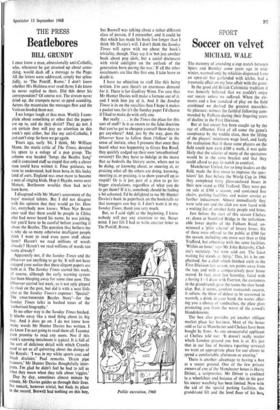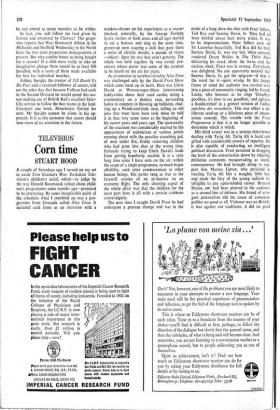Soccer on velvet
SPORT MICHAEL WALE
The memory of attending a cup match between Spurs and Burnley some years ago in mid- winter, warmed only by whiskies dispensed from an open-air bar garlanded with icicles, had a traumatic effect on my love affair with the game.
In the good old British Calvinistic tradition it was honestly believed that we couldn't enjoy our soccer unless we suffered. When the ele- ments and a low standard of play on the field combined we derived the greatest masochis- tic pleasure; witness the faithful following com- manded by Fulham during their lingering years of decline in the First Division.
But at last soccer has been caught up by the age of affluence. First of all came the games acceptance by the middle class, then the lifting of the players' minimum wage level, and lastly the realisation that if those same players on the field could now earn £100 a week, it was quite likely that the salaries of many of the spectators would be in the same bracket and that they could afford to pay to watch in comfort.
Manchester United, for so long leaders on the field, made the first move to improve the spec- tators' lot. Just before the World Cup in 1966 they completed forty glass-enclosed boxes in their new stand at Old Trafford. They were put on sale at £300 a season, and contained five chairs, parking facilities, and waiter service as further inducement. Almost immediately they were sold out and the club are now faced with a waiting list of another forty people and firms.
Just before the start of this season Chelsea FC, down at Stamford Bridge in the unfashion- able lower depths of the Fulham Road, an- nounced a 'pilot scheme' of luxury boxes. Six of these were offered to the public at £500 for the season, including one more seat than at Old Trafford, but otherwise with the same facilities. 'Within an hour,' says Mr John Battersby, Chel- sea's secretary, 'we were sold out. The latest waiting list stands at thirty.' This, let it be em- phasised, for a club which finished sixth in the First Division last season, ten points away from the top, and with a comparatively poor home record. In fact, even last Saturday, faced with a boring 1-1 draw with Everton, the customers in the grandstands gave the teams the slow hand- clap. But, it seems, comfort transcends success, it softens the blow of defeat to be cocooned in warmth, a drink in your hand, the waiter offer- ing you a choice of sandwiches, the plate glass protecting you from the worst of the crowd's blandishments.
The box also provides yet another oblique market place for business. Most of the boxes sold so far at Manchester and Chelsea have been bought by firms. As one unsuccessful applicant at Chelsea told me : 'It doesn't really matter which London ground our box is at. It's just that in our line of business (sporting services) we want an appropriate place for out clients to spend a comfortable afternoon or evening.'
There is another advantage to having a box at a soccer ground. One of the few private owners of cne of the Manchester boxes is Harry Driver, a scriptwriter. Mr Driver is confined to a wheelchair and because of this in the past his soccer watching has been limited. Now with the aid of the special parking facilities, the grandstand lift and the level floor of his box,
he can attend as many matches as he wishes.
In fact, who will follow the lead given by United and emulated by Chelsea? The grape- vine reports that West Bromwich Albion in the Midlands and Sheffield Wednesday in the North have the two most progressive managements at present. But why confine boxes to being bought for a season? If a club were really to take an imaginative plunge there would be at least 100 installed, with a score of them made available for hire for individual matches.
Johhny Speight, the creator of Till Death Us Do Part, and a fanatical follower of soccer, told me the other day that because Fulham had sunk to the Second Division he would spend this sea- son making use of British Rail's excellent Inter- City service to follow the best teams in the land. Liverpool one 'week, Manchester United the next. Mr Speight cannot be alone in his ap- proach. It is to this customer that soccer should turn more of its attention in the future.



































 Previous page
Previous page